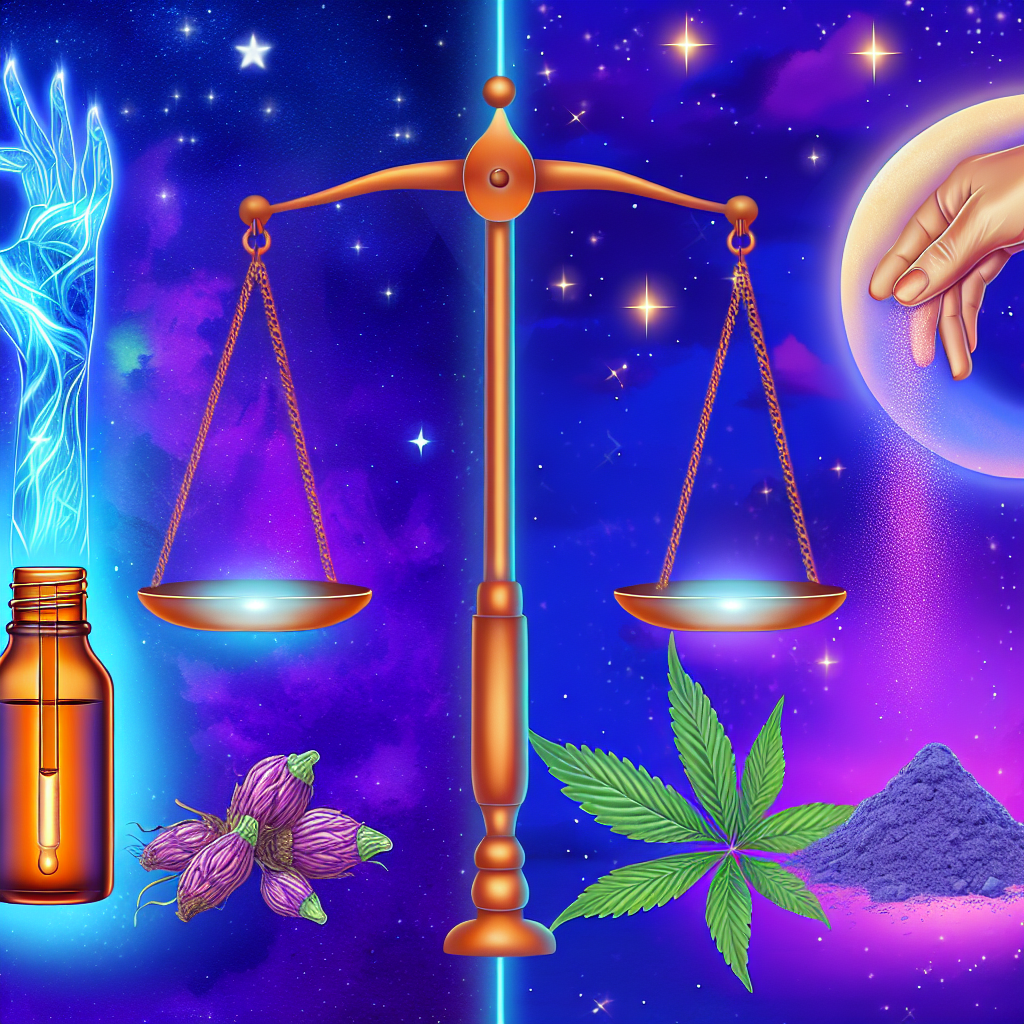CBD vs Ashwagandha for Anxiety and Sleep Support
Introduction
In today’s fast-paced world, **anxiety** and **sleep issues** affect men of all ages—from stressed-out teens facing school pressures to older adults managing health concerns and insomnia. According to the Anxiety & Depression Association of America, over 40 million U.S. adults experience **anxiety disorders**, while CDC data shows that one in three adults doesn’t get enough sleep. With the limitations of conventional medicines, many are exploring natural options such as **CBD** (Cannabidiol) and **Ashwagandha** for relief.
CBD is a non-intoxicating compound from the **cannabis** plant that supports **anxiety reduction**, better sleep, pain relief, and less inflammation. It’s available in various forms like tinctures, capsules, edibles, and beverages. Unlike THC, CBD won’t get you high.
Ashwagandha, known scientifically as Withania somnifera, is an **Ayurvedic adaptogen** traditionally used in India for over 3,000 years. It helps moderate the body’s stress response by lowering cortisol, improving sleep quality, and supporting mental and emotional well-being.
Choosing between **CBD vs Ashwagandha for anxiety and sleep** depends on your individual needs. This article explores effectiveness, scientific support, usage, side effects, and lifestyle suitability to help you make an informed decision.
Features and Scientific Evidence
CBD for Anxiety and Sleep
Scientific studies have consistently indicated the potential of **CBD for anxiety relief** and better sleep. A 2019 study from The Permanente Journal found that 79% of participants who took CBD felt reduced anxiety within just one month, and 66% experienced improved sleep.
CBD works through the **endocannabinoid system** (ECS), specifically targeting CB1 and CB2 receptors, which are linked to mood and sleep regulation. This biochemical interaction allows CBD to quickly influence the nervous system, promoting calmness and sleep onset.
Men dealing with **performance anxiety**, social anxiety, or **stress-related insomnia** may benefit from CBD, especially when taken in fast-acting forms like sublingual oils or vaporizers. Full-spectrum CBD, which includes various cannabinoids and terpenes, may prove more potent because of the entourage effect.
Ashwagandha for Anxiety and Sleep
Ashwagandha has recently gained traction in Western clinical studies as well. A 2021 randomized placebo-controlled trial published in Cureus Journal indicated that people taking 600 mg of Ashwagandha extract daily experienced lower stress levels and enhanced sleep quality after just eight weeks.
It doesn’t act directly on neurotransmitters like CBD but instead helps **support the adrenal system**, mainly by reducing high cortisol, a stress hormone. Over time, this can lead to improved mental stability and reduced fatigue. Additional studies, such as one from the Journal of Ethnopharmacology, confirm that Ashwagandha can improve **sleep duration and quality**, and reduce the time it takes to fall asleep.
Because Ashwagandha supports adaptation to chronic stress, it may be ideal for professionals, athletes, or elderly men dealing with **long-term stress** and low energy rather than acute episodes.
Comparative Effectiveness
CBD is generally **fast-acting**, making it suitable for those who need quick relief from **acute anxiety** or **occasional insomnia**, like students during exam season or professionals before big presentations. Effects can be felt within minutes with inhalation and within an hour for oral products.
In contrast, Ashwagandha is a **building adaptogen**, requiring consistent use over several weeks to show maximal benefits. It may not provide immediate anxiety relief but is excellent for enhancing resilience to ongoing stressors and **restoring sleep balance long-term**.
Safety-wise, both are generally well-tolerated when used correctly. CBD can interfere with specific medications like blood thinners due to liver metabolism via Cytochrome P450 enzymes, so medical advice is necessary. Ashwagandha may impact **blood pressure, blood sugar**, or **thyroid hormones**, especially in high doses, and is not recommended during pregnancy.
Conclusion
If you’re deciding between **CBD or Ashwagandha for sleep and anxiety**, the answer lies in your specific concerns and desired speed of outcome.
Use **CBD** if you need quick, short-term relief—particularly helpful for anxiety attacks or pre-event insomnia. It interacts with your nervous system almost immediately, promoting a sense of calm.
Turn to **Ashwagandha** if you’re looking for a sustainable solution to chronic stress, burnout, or fatigue-related insomnia. It gradually normalizes stress hormones and improves sleep patterns over time.
Always consult your healthcare provider before beginning any supplement regimen, especially if you have underlying health conditions or take other medications.
Whether used individually or in a professionally guided combination, both remedies offer compelling support for the modern man’s pursuit of **mental wellness and restful sleep**.
Concise Summary
CBD and Ashwagandha both offer natural relief for anxiety and sleep problems, but in different ways. CBD provides faster effects by interacting with the nervous system and endocannabinoid receptors, making it ideal for acute stress or insomnia. Ashwagandha works gradually by lowering cortisol levels and improving long-term resilience to stress. CBD is ideal for situational anxiety and immediate needs, while Ashwagandha suits people dealing with prolonged stress and fatigue. Both are generally safe but may interact with medications, so professional guidance is advised. The best choice depends on your specific health goals and lifestyle needs.
References
1. Shannon, S., Lewis, N., Lee, H., & Hughes, S. (2019). [Cannabidiol in Anxiety and Sleep: A Large Case Series](https://www.ncbi.nlm.nih.gov/pmc/articles/PMC6326553/). The Permanente Journal.
2. Langade, D. et al. (2019). [Clinical Evaluation of the Anti-stress Effects of Ashwagandha Root Extract](https://www.ncbi.nlm.nih.gov/pmc/articles/PMC6750292/). Cureus Journal of Medical Science.
3. Choudhary, D. et al. (2017). [Ashwagandha and Its Effects on Sleep and Anxiety](https://www.ncbi.nlm.nih.gov/pmc/articles/PMC7096075/). Cureus Journal.
4. Murillo-Rodríguez, E. et al. (2020). [CBD and Sleep: A Review of Human Clinical and Prospective Studies](https://pubmed.ncbi.nlm.nih.gov/31965295/). Current Psychiatry Reports.
5. Raut, A. A. et al. (2012). [Safety and Effects of Ashwagandha in Healthy Volunteers](https://pubmed.ncbi.nlm.nih.gov/23394879/). Complementary Therapies in Medicine.

Dominic E. is a passionate filmmaker navigating the exciting intersection of art and science. By day, he delves into the complexities of the human body as a full-time medical writer, meticulously translating intricate medical concepts into accessible and engaging narratives. By night, he explores the boundless realm of cinematic storytelling, crafting narratives that evoke emotion and challenge perspectives. Film Student and Full-time Medical Writer for ContentVendor.com



